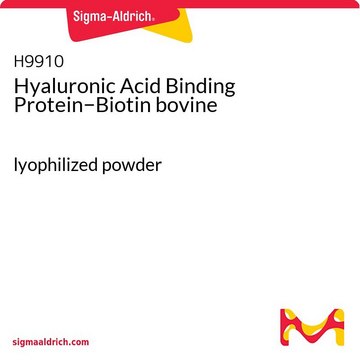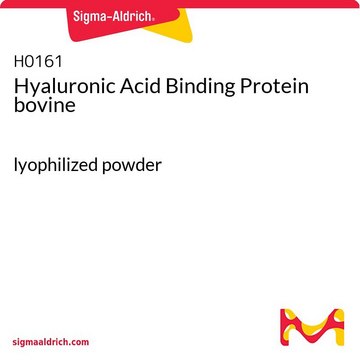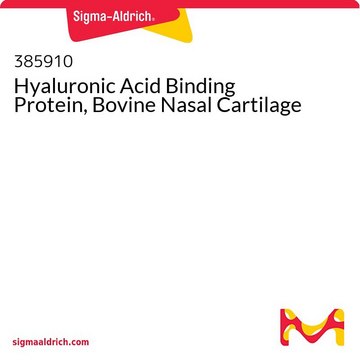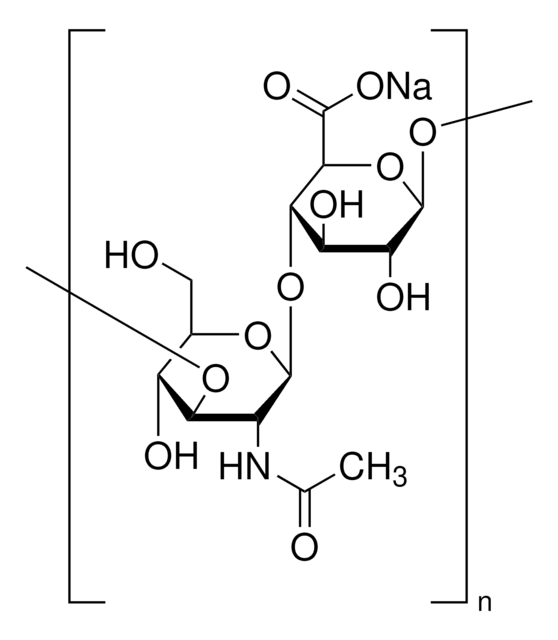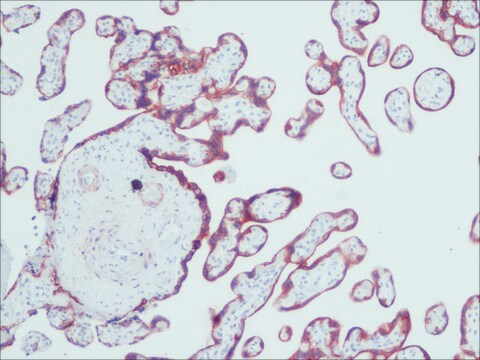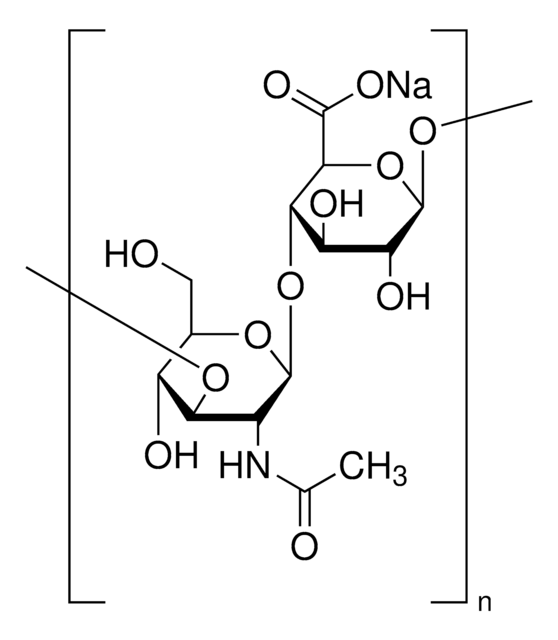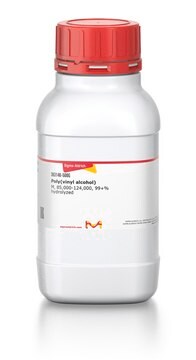385911
Hyaluronic Acid Binding Protein, Bovine Nasal Cartilage, Biotinylated
Synonym(s):
Binding Protein for Hyaluronic Acid, Biotinylated Hyaluronic Acid Protein, Bovine Nasal Cartilage Protein
Sign Into View Organizational & Contract Pricing
All Photos(1)
About This Item
UNSPSC Code:
12352202
NACRES:
NA.21
Recommended Products
biological source
bovine (nasal cartilage)
Quality Level
form
lyophilized
manufacturer/tradename
Calbiochem®
storage condition
OK to freeze
shipped in
wet ice
storage temp.
−20°C
General description
Affinity purified. Binds specifically and strongly to hyaluronic acid (≥ 2000 M.W.). Composed of two binding polypeptides, which are derived from N-terminal regions of the hyaluronic acid binding proteoglycan and linkage proteins. Useful for ELISA and histochemistry.
Affinity-purified. Binds specifically and strongly to hyaluronic acid (≥2000 M.W.). Composed of two binding polypeptides, which are derived from N-terminal regions of hyaluronic acid binding proteoglycan and linkage proteins. Useful for ELISA and histochemistry.
M.W. 70,000-80,000 and 40,000-45,000.
Warning
Toxicity: Standard Handling (A)
Physical form
Lyophilized from 0.1 M sodium bicarbonate solution, pH 8.3
Reconstitution
Following reconstitution, aliquot and freeze (-20°C). Stock solutions are stable for up to 6 months at -20°C.
Reconstitute with 100 µl distilled H₂O.
Other Notes
Tammi, R., et al. 1998. J. Biol. Chem. 273, 28878.
Kohda, D., et al. 1996. Cell 86, 767.
Heinegard, D., and Hascall, V.C. 1974. J. Biol. Chem. 249, 4250.
Kohda, D., et al. 1996. Cell 86, 767.
Heinegard, D., and Hascall, V.C. 1974. J. Biol. Chem. 249, 4250.
Legal Information
CALBIOCHEM is a registered trademark of Merck KGaA, Darmstadt, Germany
Storage Class Code
11 - Combustible Solids
WGK
WGK 1
Flash Point(F)
Not applicable
Flash Point(C)
Not applicable
Certificates of Analysis (COA)
Search for Certificates of Analysis (COA) by entering the products Lot/Batch Number. Lot and Batch Numbers can be found on a product’s label following the words ‘Lot’ or ‘Batch’.
Already Own This Product?
Find documentation for the products that you have recently purchased in the Document Library.
Customers Also Viewed
Kazadi Nadine Mutoji et al.
BMC immunology, 22(1), 52-52 (2021-08-06)
Current research suggests that the glial scar surrounding penetrating brain injuries is instrumental in preserving the surrounding uninjured tissue by limiting the inflammatory response to the injury site. We recently showed that tumor necrosis factor (TNF)-stimulated gene-6 (TSG-6), a well-established
Vic Zamloot et al.
Cancers, 14(19) (2022-10-15)
Hyaluronic acid (HA) is highly elevated in breast cancers compared to normal breast tissue and is associated with increased tumor aggressiveness and poor prognosis. HA interacts with cell-trafficking CD44 receptors to promote tumor cell migration and proliferation and regulates both
Odise Cenaj et al.
Communications biology, 4(1), 436-436 (2021-04-02)
Bodies have continuous reticular networks, comprising collagens, elastin, glycosaminoglycans, and other extracellular matrix components, through all tissues and organs. Fibrous coverings of nerves and blood vessels create structural continuity beyond organ boundaries. We recently validated fluid flow through human fibrous
Jeremy Herrera et al.
JCI insight, 4(1) (2019-01-11)
The extracellular matrix (ECM) in idiopathic pulmonary fibrosis (IPF) drives fibrosis progression; however, the ECM composition of the fibroblastic focus (the hallmark lesion in IPF) and adjacent regions remains incompletely defined. Herein, we serially sectioned IPF lung specimens constructed into
Lisa DiNatale et al.
Frontiers in medicine, 8, 724344-724344 (2021-10-05)
Topical antiaging products are often a first-line intervention to counter visible signs of facial photoaging, aiming for sustained cosmetic improvement. However, prolonged application of a single active topical compound was observed clinically to lead to a plateau effect in improving
Our team of scientists has experience in all areas of research including Life Science, Material Science, Chemical Synthesis, Chromatography, Analytical and many others.
Contact Technical Service